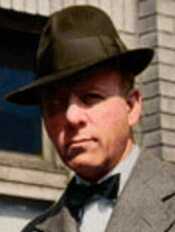The Waterbury Democrat (October 8, 1946)
Condemned Nazis keep controlled
Goering weeps when pictures of wife, daughter are removed
Nuernberg (UP) – Hermann Goering burst into a fit of weeping when he decided to remove pictures of his wife and daughter from his cell, a U.S. Army officer revealed today, but none of the condemned Nazis has shown any sign of collapse.
The Army lifted a corner of the curtain of secrecy over the Nuernberg prison where the Nazi war criminals were waiting out their last eight days. The glimpse inside the “death row” showed some of them jittery and distraught, but all keeping themselves under control.
On orders from Berlin prison officials began a series of two daily press conferences. The first dealt largely with dispelling loose rumors, and giving fragments of information on the prisoners.
Connecticut men in charge
Maj. Frederick Teich of Newington, Connecticut, officer of the Internal Security Detachment since the War Crimes Trial began, presided at the first conference. He was flanked by public relations officers.
Taking up a sheaf of questions, he disposed of the bulk of them with negatives. No details of the executions were available. He did not know who the hangman would be. Master Sgt. John C. Woods, a likely candidate, is not listed at present on the prison staff. No apparatus for the executions is in the prison. Physical preparations have not yet begun.
Disclosing for the first time that there had been no breakdowns or collapses among the condemned men, Teich said Goering after a spell of brooding came to a decision to get the pictures of his wife and daughter out of his cell. He put them in an envelope and sent them to his lawyer. Then he blubbered like a small boy from whose hand a treasure has been snatched.
Of all the convicted men, Goering generally retained the most dignity, the officer reported. He was followed closely by Konstantin von Neurath and Wilhelm Keitel, the latter never losing his precise military poise.
Raeder despondent
Grand Adm. Erich Raeder, who asked that his life imprisonment sentence be changed to death before a firing squad, was reported to be the most despondent of the prisoners, and Rudolf Hess the most indifferent.
Keitel, Hans Frank, Julius Streicher and Joachim von Ribbentrop were writing or had finished their “memoirs.” They were censored and passed on to defense lawyers without deletion, Teich said, nothing objectionable having been found.
Questioned about precautions against any suicide attempts, Teich said the precautions remained the same, being so good that they could not be improved upon.
The prisoners have complained little, he said. But once they lamented that their guards were stealing souvenir items from them. They get American cigarettes. Ribbentrop and Goering get sedatives at night, but their health remains the same.
Nine attend services
All but Hess and Alfred Rosenberg have religious services in their cells once a day.
The Allied Control Council has ordered lawyers to cease visiting the cells of the condemned men after Sunday.
Teich said the status of Franz von Papen, one of the three acquitted defendants, was that of protective custody at his own request. The U.S. Third Army has been told to give him refuge as long as he asks for it. He said Von Papen still was trying to get into the British zone.
Jail officials have placed the condemned men in a lower row of cells and the seven Nazis who received prison terms have been placed above them.
Schacht in middle
The fate of Hjalmar Schacht, one of the three acquitted leaders, continued in a muddle. Schacht spent the night in the Stuttgart city jail, under arrest for de-Nazification proceedings, while Stuttgart and Nuernberg city officials argued about which city would try him.
Schacht went to Stuttgart yesterday to visit a friend, apparently thinking he was immune from arrest until summoned before a de-Nazification court. He was promptly arrested despite his protests.
Dr. Frederick Bergold, Schacht’s attorney, said in Nuernberg that Stuttgart police have blocked his efforts to reach Schacht. Bergold said American Military Government officials gave Schacht assurance he would not be arrested in the American zone.
American security officers said last night they had warned Schacht the “free passage” order issued in Bavaria, where Nuernberg is located, might not be good in Wurttemberg, where Stuttgart lies. Bergold denied this.
